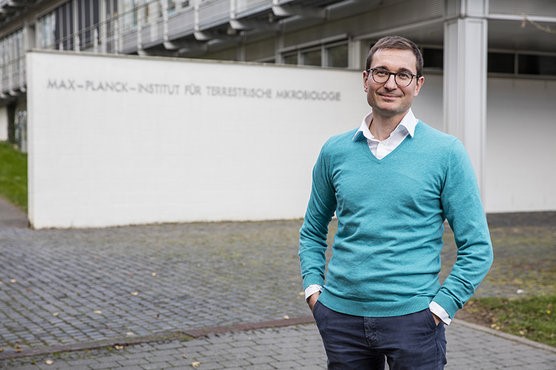
Carbon dioxide (CO2) is a critical factor in global warming. At the same time, this atmospheric greenhouse is also a freely available carbon source that could provide the feedstock for a carbon-neutral society. While chemistry still lacks strategies for the sustainable capture and conversion of atmospheric CO2, Nature has invented photosynthesis. However, despite billions of years evolution, natural photosynthesis will not be sufficient to cover the ever growing global demand for a sustainable food, fuel and chemical production.
Our lab uses synthetic biology, to explore alternative solutions to natural photosynthesis that evolution has not explored (yet). In my talk I will first discuss the limitation of naturally existing CO2 fixing enzymes and pathways. I will then present strategies how to discover and engineer novel enzymes for the fixation of CO2 and further exemplify how these enzymes can be used to design and realize new-to-nature metabolic networks for the highly efficient conversion of CO2. Finally, I will demonstrate how these networks can be transplanted into natural and synthetic cells to create novel CO2 converting systems that outcompete natural photosynthesis and interface the natural and the synthetic biological world.
Tobias J. Erb is a microbial biochemist and Director at the Max Planck Institute for terrestrial Microbiology in Marburg, Germany. His research centers on the discovery, the function and the design of novel CO2 converting enzymes from microorganisms, algae and plants and their use in engineered and artificial photosynthesis as well as synthetic chloroplasts and cells. Tobi studied Chemistry and Biology and did his PhD at the University of Freiburg (Germany) and the Ohio State University. After a postdoc at the University of Illinois, he headed a Junior Group at ETH Zürich (Switzerland) before he became a Group Leader at the Max Planck Institute in Marburg, where he was promoted to Director in 2017. Tobi’s work received numerous awards, among them the Heinz Maier-Leibnitz Prize in 2016 and the Otto Bayer Award in 2018. He was named as one of 12 up- and coming scientists by C&EN of the American Chemical Society in 2015 and elected to the Young Academy at the National Academy of Science in 2013.
For details of his research and recent publication, please visit HERE
© Copyright International BioDesign Research Conference - All rights reserved